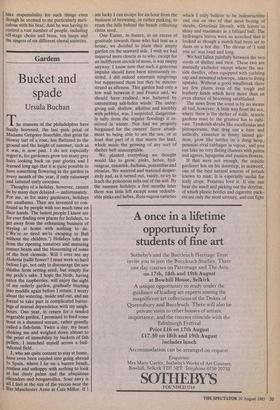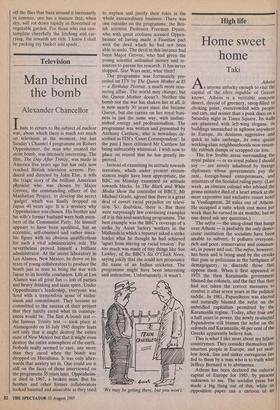Gardens
Bucket and spade
Ursula Buchan
The stamens of the philadelphus have finally browned, the last pink petal of Madame Gregoire Staechlin, that great fat blowsy tart of a rose, has fluttered to the ground and the height of summer, such as it was, is now past. I do not especially regret it, for gardeners grow too many grey hairs looking back on past glories and I learned long ago that it is quite possible to have something flowering in the garden in every month of the year, if only rainswept and tattered early crocuses.
Thoughts of a holiday, however, cannot be by many days delayed — unfortunately. For me, as for many gardeners, holidays are anathema. They are invented to con- found us by people with too much time on their hands. The laziest people I know are for ever finding new places for holidays, to get away from the exhausting business of staying at home with nothing to do. (We're so tired we're escaping to Bali without the children.') Holidays take me from the ripening tomatoes and maturing runner beans and the blossoming of some of the best clematis. Will I ever see my Hoheria lyallii flower? I must work so hard before I go, not only to discourage the sow thistles from setting seed, but simply for my pride's sake. I hope the birds, having eaten the raspberries, will enjoy the sight of my orderly garden, gradually blurring into muddle again before I return. I worry about the watering, inside and out, and am forced to take part in complicated barter- logs of mutual dependence with my neigh- bours. One year, in return for a tended vegetable garden, I promised to feed some trout in a dammed stream, rather grandly called a fish-farm. Twice a day, my heart choking me and weighed down almost to the point of immobility by buckets of fish Pellets, I launched myself across a bull- infested field.
I, who am quite content to stay at home, have even been cajoled into going abroad to Spain, where I lie on a barren beach, restless and unhappy with nothing to look at but dusty palms and the ubiquitous oleanders and bouganvillea, Sour envy is all I feel at the size of the yuccas near the Bar Manchester Arms at Cala Millor. If I am lucky I can escape for an hour from the business of browning, or rather pinking, to roam the hills behind the beach collecting cistus seed.
One Easter, in Sussex, in an excess of gratitude towards those who had lent us a house, we decided to plant their empty garden on the seaward side. I wish we had inquired more closely as to why, except for an indifferent stretch of moss, it was empty anyway. I know now that such a generous impulse should have been strenuously re- sisted. I did indeed entertain misgivings but suppressed them lest they be miscon- strued as idleness. This garden had only a low wall between it and France and, we should have realised, was battered by unremitting salt-laden winds. The unfor- giving soil, shallow, alkaline and knobbly with pebbles, was, I suspected, dangerous- ly salty from the regular floodings it re- ceived in winter. Nor had we properly bargained for the owners' fierce attach- ment to being able to see the sea, or at least that part of it that meets the land, which made the growing of any sort of shelter belt unacceptable.
We planted everything we thought would like to grow: pinks, hebes, hyd- rangeas, tamarisk, fuchsias, potentillas and olearias. We watered and watered desper- ately and, as it turned out, vainly, to try to leach the poisonous salts out of the soil. By the summer holidays a few months later there was little left except some redoubt- able pinks and hebes, Rosa rugosa varieties which I truly believe to be indestructible and one or two of that most boring of shrubs, Griselinia littorals, with leaves as shiny and inanimate as a billiard ball. The hydrangea leaves were so scorched that it looked as though a match had been set to them on a hot day. The chorus of 'I told you so' was loud and long.
We had fallen painfully between the two stools of shelter and view. These two are mutually exclusive except where the sea- side dweller, often equipped with yachting cap and mounted telescope, takes to living upstairs. Without a good windbreak there are few plants even of the tough and leathery kinds which have more than an even chance of becoming established.
The news from the coast is by no means all bad, however. A little way from the sea, where there is the shelter of walls, seaside gardens must be the greatest fun to culti- vate. Tenderish shrubs like escallionias and pittosporums, that drag out a bare and unthrifty existence in frosty inland gar- dens, grow like nettles on a dung heap, petunias rival cabbages in vigour, and you can take no very daring chances with palms and agaves, lapagerias and passion-flowers.
If that were not enough, the seaside gardener has on his doorstep, in seaweed, one of the best natural sources of potash known to man; It is especially useful for leafy crops. Potatoes love it. If one can bear the smell and picking out the detritus, of which plastic bottles and cigarette pack- ets are only the most savoury, and can fight off the flies that buzz around it incessantly in summer, one has a manure that, when dry, will rot down rapidly in flowerbed or vegetable garden. For those who can con- template cheerfully the fetching and car- rying, the rewards are rich. I know I shall be packing my bucket and spade.











































 Previous page
Previous page